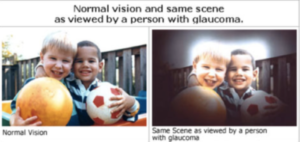What is glaucoma?
Glaucoma is the term used to describe a number of related conditions that cause damage to the optic nerve, which transmits information from the eye to the brain. It usually (but not always) is associated with high intraocular pressure (IOP). Left untreated, glaucoma can cause blindness.
Who is most at risk for glaucoma?
If you’re over age 60, diabetic or have a family member with glaucoma, you are at higher risk for glaucoma than others.
Is there any way to prevent glaucoma?
Though it’s unclear whether glaucoma can be prevented, you might be able to reduce your risk for the disease by maintaining a healthy lifestyle. My suggestion would be to avoid smoking and excessive alcohol, eat a healthy diet, keep your weight down, exercise, take nutritional products and be sure to see your eye specialist on a regular basis.
What are the signs and symptoms of glaucoma?
There are usually no signs that you’re developing glaucoma until vision loss occurs, which is why it’s so important to have regular eye exams. Your eye doctor can detect and treat high IOP before it progresses to optic nerve damage and vision loss.
Is glaucoma curable?
Vision loss from glaucoma cannot be reversed. Routine eye exams are essential to discover glaucoma early and begin glaucoma treatment before significant vision loss has occurred.
What glaucoma treatments are currently available?
Doctors usually prescribe special glaucoma eye drops that reduce intraocular pressure. These are used one or several times a day, depending on the medication. If the drops don’t work, surgery may be the next step. In some cases, surgery might be the first option for glaucoma treatment.

